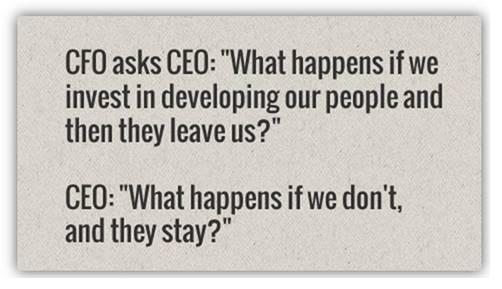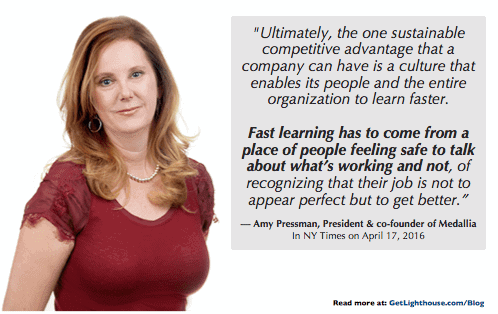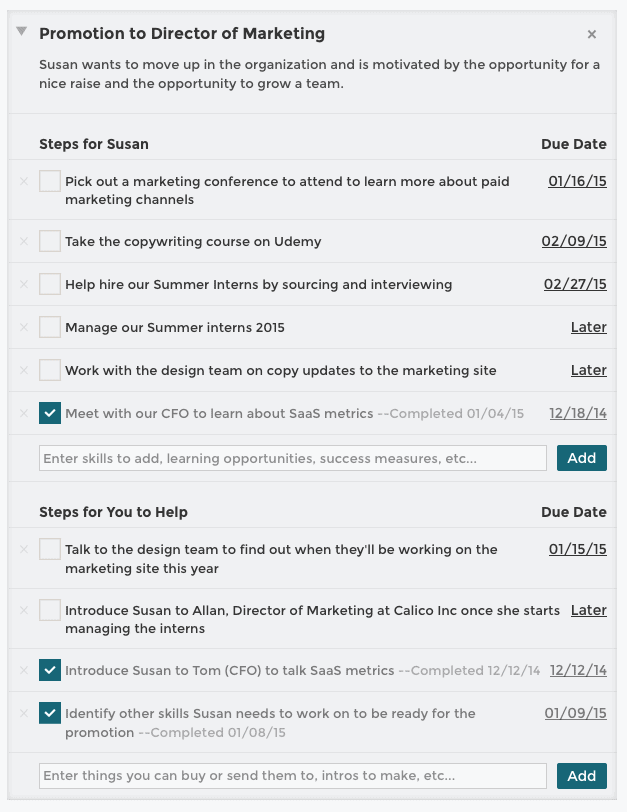"Before you are a leader, success is all about growing yourself. When you become a leader, success is all about growing others." - Jack Welch, former CEO of General Electric 1981-2001.
One of the most powerful conversations you can have as a manager with a team member is about their goals. Not company KPIs, not the next core project and their responsibilities, their goals.
When you tap into someone's core drivers, you maximize their motivation on the job. They'll even do much of the work on their own time.
They'll also do much of the work on their own. According to a 2012 study by The Alliance (P. 44), "75% of employees say that they're willing to use their own time to further their careers and take on additional learning that would benefit them at work."
Regardless of age, your people have goals. And if you tap into those goals, they'll be motivated to do more than the task at hand, but all of their work. And connecting with their goals will improve your relationship with them as well.
But how do you do that?
Since starting Lighthouse, I've spoken to hundreds of managers.
And an all too common theme I've found has been an aversion to discussions about their team's goals. The problem? The fear of not knowing how to talk about those goals with them.
Let's end that excuse today.

Table of Contents:
- How to talk about personal development and career goals with your team
- To get a good, honest conversation going, try these tactics
- Ask good questions to spark the conversation
- Don't just talk. Make progress on their goals
- Make progress with small wins
- Managers should have steps to help their teams, too!
- Help them find a mentor
- Reflect on and celebrate progress along the way
- Do's an don'ts for discussing personal goals with your team
- Show your team that you care about their goals

How to talk about personal development and career goals with your team
The first step in helping your team members achieve their goals is to understand what their goals are. For many, they've never been asked this question so they may not have a great answer ready. Also, they may be afraid to share their goals if they think it doesn't align with their current job with you.
To help get a good, honest conversation going, try these tactics:
- Invest in getting to know them more: If you have more rapport with your people by knowing who they are, what their passions are outside of work, and what drives them, they'll be more likely to open up.
- Tell them their career success matters to you: If you really want them to have happy, fulfilling careers, you need to embrace that they won't work for you forever. Your reward for this is that they'll work harder and love working for you while they do. Let them know you have that belief.
- Share your goals first: If you trust them by sharing your goals, they are more likely to share their goals. This is an example of the reciprocity principle.
If someone still isn't ready to talk about their goals, don't force it. Help those on your team ready to discuss it and revisit this discussion from time to time. Circumstances change for people, and seeing you grow other people may be just what they need to see to be ready to talk about their goals.

Ask good questions to spark the conversation
Now that you've built some trust, you need to start asking about their goals. Depending on the culture of your company and how formal your relationship with your team is, different questions may work best. So, here are a few ideas so you can choose what works best for you.
From our post on one on one meeting questions great managers ask their teams:
There's a variety of things you can talk about in one on ones. Here's a selection of some of the ones we collected for talking about long term goals:
- "What are your long term goals? Have you thought about them?"
- "Do you feel like you're making progress on your big goals here? Why or why not?"
- "Do you feel we're helping you advance your career at a pace you would like?"
- "What are your superpowers? What powers would you like to develop?"
- "Could you see yourself making progress on more of your goals here? What would need to change?"
- "What are your big dreams in life? Are you making progress on them?"
- "What work are you doing here that you feel is most in line with your long term goals?"
- "If you had millions of dollars, what would you do every day?"
- "As a kid, what did you want to be when you grew up?"
Want to keep track of all of these questions in one place? Download our free 1:1 meeting template below.

From The Alliance by Linkedin cofounder Reid Hoffman, with Ben Casnocha, & Chris Yeh:
The Alliance is all about the new way to manage teams recognizing the current state of the world, where companies are more prone to layoffs and people change jobs frequently. Their focus is on setting up Tours of Duty to create defined jobs aligned with people's interests and goals, so they have some great questions to spark that conversation:
- "What do you want to be doing in five years?" and work backward to what needs to be the path starting today.
- "Who do you look at and say, 'I want to be him/her someday?" and work back on how to get into the kinds of roles they've had.
- "What job do you envision having after you leave [this company]?", which admits the truth that no one works at a company for life anymore, and opens the door to opportunities in other roles in your company they may not know about.
From the team at Next Big Sound:
In a coffee meeting with CEO David Hoffman, I learned they had a simple line of questions that was more fun, and less corporate-y that they used to uncover goals:
- "Imagine it's 10 years from now and there's a party celebrating you and your accomplishments . . . Who is there? What music is playing? And what is the accomplishment everyone is there to celebrate?"
- From there, they work backward to what a 5-year, 3-year, and finally 1-year goal would be to get you closer to that. They then focus on helping you with the 1-year goal.

Don't just talk. Make progress on their goals.
Talking about their goals is great. But if all you're doing is talking, it won't have the lasting, motivating impact on your team.
Too often, I've heard from managers and employees alike that goals are often a checkbox on an annual review that gets filled out and then never discussed until the next review. Not surprisingly, the second time this question is asked in a review, the goal is not exactly something they're excited to discuss.
Often, this story plays out that the employee gives up on the company helping them reach their goals and eventually leaves to go somewhere else that provides the opportunities that align with their goals and growth.
Instead, you should take advantage of the Progress Principle, discovered by psychologists Teresa Amabile and Steven Kramer:
"Of all the things that can boost emotions, motivation, and perceptions during a workday, the single most important is making progress in meaningful work."

Make progress with small wins.
It's easy to get intimidated when a goal is large and feels distant. The best way to overcome this is to break the goal into small steps you can both do to help.
So what are some ways to break things down into small steps? Discuss together:
- "What skills do you need to add to be ready for that role? How can you build those skills incrementally?"
- Example: A marketing manager wants to become a director of marketing. They should learn about the company's revenue metrics so they understand the business drivers better.
- "What project(s) should you be included in?"
- Example: A support team member wants to get into marketing. They could start by contributing to the company blog or help with a new e-book.
- "How could you get more experience in that area?"
- Example: An engineer wants to start giving tech talks at conferences. They could start by giving a talk at lunch to part of the team and then present at a local tech meetup.
- "What do you need to learn more about?"
- Example: A designer is interested in learning more about product management. Buy them a good book, send them some great blog posts, or send them to a conference to learn more.
- "Who would be a good mentor or person to meet to talk about this goal?"
- Example: A product manager wants to learn how to code. Connect them to one of the friendlier engineers on the team who can help them set up a dev environment.
You can also help them by making sure each step follow the classic SMART model:
- Specific – target a specific area for improvement.
- Measurable – quantify or at least suggest an indicator of progress.
- Assignable – specify who will do it.
- Realistic – state what results can realistically be achieved, given available resources.
- Time-related – specify when the result(s) can be achieved.

Managers should have steps to help their teams, too!
While your team member whose goal it is should be putting in the biggest effort to reach their goal, you can do a lot to help them succeed:
- Serve as a mentor yourself: If you're experienced in their goal, helping them reach it can strengthen your relationship. You can also introduce them to a mentor (My career was transformed by such an introduction - more on helping people find a mentor in the section below).
- Buy them a book, resource, or conference pass: As a manager, you likely have at least a modest budget to invest in your team. The right books are a great, inexpensive way to level up your people.
- Get approval for things they need: Going to bat for a team member to get them needed resources or approval for a project will engender great loyalty and appreciation.
- Get them on future related projects: Maybe you can't help them right away, but remembering the promise to get them involved in a project months or quarters down the line will be something they won't soon forget.

Help them find a mentor to boost their career growth
Finding a mentor for your team member has been proven to hypercharge an employee’s growth - a 5-year study by Sun Microsystems found that:
- Employees with mentors were promoted 5x more often
- Mentors were 6x more likely to have been promoted as well.
Unfortunately, great mentors can be difficult to find for all of your team members. That’s because they have to be a good match for your team members in terms of their skill set, personality, and availability.
Here are some tips on where they can find a mentor and how to approach them.
Where can you find a mentor?
If you work at a large company with 10,000+ employees, a great place to start looking for a mentor for your team members is within your own company.
Unfortunately, sometimes you won’t be lucky enough to find the perfect mentor for them within your own company or network. Luckily, there are a few other places you can include as part of your search:
- Industry Groups: No matter your role, there’s an association or community related to your work that you or your team member can join. In either case, there’s a good chance the organizers of the group may be able to help if you ask, or serendipity at an event may lead to a great connection.
- Slack Communities, Facebook groups, or Reddit: Many online communities are worth scouting for potential mentors. To find a mentor in one of these places, you can start a post or a thread, ask some questions, or contact active members directly seeking advice.
- Linkedin: Another good idea is to go through your connections on Linkedin. You may find someone you've not talked to in a while who can help develop your people’s skills. You can also use search filters and look for experts based on their job title or skillset.
- Twitter: Although it’s probably not the first place you’d think of when looking for a mentor, there’s a lot of great professional advice you can find on Twitter. People there tend to respond to @ replies and DM’s more than on other platforms.
- Clarity: Clarity.fm is a community of experts from various professions you can schedule calls with and ask questions. Unlike the other free options we’ve covered so far, this is a paid service, but if you need a really great mentor for a specific challenge it could be worth it. They could also become a coach that your company pays for on an ongoing basis.
By trying a mix of the above sources, and empowering your team to do the same, it’s likely all of your team members can find a mentor or two that can help in specific situations.
For more tips on how to help your team member find a mentor check out this post:
Here's an example of what an in-progress goal might look like:
Reflect on and celebrate progress along the way.
As important as all the ways you can contribute to their goal are, you can also help a ton by holding them accountable. When you help them set a big goal or a new area for growth, it's easy to get discouraged. Reminding them how far they've come and celebrating the small wins along the way can keep them motivated to charge ahead on the goal and keep their morale high. A good manager is a coach.
The best time to check in on progress, as well as have the initial goals discussion, is in their one on ones. Since it's a consistent, private meeting for both of you, it's easy to make these part of the topics you rotate through. The best managers I've spoken to suggest once a month is a good frequency to check in on their goals.

Do's and don'ts for discussing personal goals with your team
Here are a few closing tips that can help you make the most of these discussions:
- Don't force it: They have to want it. If they don't focus on those that do have goals; you'll get the return on your investment in them and might just set the example that gets others to open up.
- Do experiment without locking in: If they are unsure, don't create a huge plan. Just create a few steps that will help them explore to see if it really is something they want.
- Don't go months without checking in: Losing momentum on a goal and feeling like the company doesn't care is a huge risk if you don't check in semi-regularly on the goal and celebrate small wins along the way.
- Do talk about it in every few one on ones: Since one on ones are all about them anyway, this is a perfect time to be sure you have on your calendar to have this discussion.
- Don't be afraid to let people outgrow their role: Expecting people to do the same thing for years is unrealistic. There's no point in pretending that you're giving them a job for life or that they'll work with you forever.
- Do your best to help them succeed: It's incredibly rewarding to see people on your team grow and go onto to do new, awesome things. They'll repay you with hard work while they work for you.
- Bonus: If you get promoted, you can often promote your best people, too. Everyone wins because you grew your people.
- Don't set too short a time horizon: Be realistic. These goals are usually around other responsibilities, so plan accordingly and don't be overly ambitious. Steady progress is the goal.
- Do manage their expectations: Big goals and promotions may take years. If you set the expectation from the start that it's the case, then they're more likely to stick with it over the long haul.
- Don't let your own knowledge or skills limit their growth: Especially if you manage people from other disciplines that you came from (like an engineer managing designers), don't expect to have all the answers yourself.
- Do enlist the help of others to help them succeed: Finding someone the right mentor, or getting advice from the right person on how to help and empower them can transform the progress people can make on a goal.

Show your team that you care about their goals
Showing your team that you care about their goals is a powerful way to build rapport and increase their motivation.
By showing them that their success matters to you, even if those goals don't perfectly align with their current position, you're also building trust. That trust then helps keep communication lines clear and feedback flowing both ways.
But there's more you can do to develop your employees. And working with your team to achieve their goals isn't the only way to motivate them.
Here are some additional resources on motivation, goals, and one-on-ones:
Goals and employee development:
Employees are more interested in their own development and training than ever before. However, not everyone is in the same situation for what growth may look like for them. It can vary based on what they know they want, their career or life stage, and what options you have available to them.
That's why we have a number of other posts to help you with whatever curve balls your team throws at you. Here's further reading on how to help your people grow regardless of the situation and circumstances:
- How to help when your team member can't answer "What are your career goals?”
- Employee Development Plans: The Competitive Edge to Winning the World Series and Helping Your Team Thrive
- The 3 Questions Every Manager Struggles with Making Career Development Plans
- Employee Development: How to grow your employees when you can't promote them





